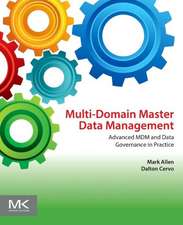Developing High Quality Data Models
Autor Matthew Westen Limba Engleză Paperback – 6 feb 2011
The book is organized into four parts. Part 1 provides an overview of data models and data modeling including the basics of data model notation; types and uses of data models; and the place of data models in enterprise architecture. Part 2 introduces some general principles for data models, including principles for developing ontologically based data models; and applications of the principles for attributes, relationship types, and entity types. Part 3 presents an ontological framework for developing consistent data models. Part 4 provides the full data model that has been in development throughout the book. The model was created using Jotne EPM Technologys EDMVisualExpress data modeling tool.
This book was designed for all types of modelers: from those who understand data modeling basics but are just starting to learn about data modeling in practice, through to experienced data modelers seeking to expand their knowledge and skills and solve some of the more challenging problems of data modeling.
- Uses a number of common data model patterns to explain how to develop data models over a wide scope in a way that is consistent and of high quality
- Offers generic data model templates that are reusable in many applications and are fundamental for developing more specific templates
- Develops ideas for creating consistent approaches to high quality data models
Preț: 288.56 lei
Preț vechi: 451.69 lei
-36% Nou
Puncte Express: 433
Preț estimativ în valută:
55.23€ • 60.02$ • 46.43£
55.23€ • 60.02$ • 46.43£
Carte tipărită la comandă
Livrare economică 14-28 aprilie
Preluare comenzi: 021 569.72.76
Specificații
ISBN-13: 9780123751065
ISBN-10: 0123751063
Pagini: 408
Ilustrații: Approx. 120 illustrations
Dimensiuni: 191 x 235 x 23 mm
Greutate: 0.7 kg
Editura: ELSEVIER SCIENCE
ISBN-10: 0123751063
Pagini: 408
Ilustrații: Approx. 120 illustrations
Dimensiuni: 191 x 235 x 23 mm
Greutate: 0.7 kg
Editura: ELSEVIER SCIENCE
Public țintă
This book is intended for data management professionals with job functions that include data modeler; data architect; database designer; database application developer and application architect.Cuprins
Chapter 1: What are Data Models For?
Chapter 2: Different Sorts of Data Models
Chapter 3: Languages and Notations for Data and Data Models
Chapter 4: Layout of Data Models
Chapter 5: Reviewing and Improving Data Models
Chapter 6: High Quality Data Models
Chapter 7: Principles for Data Models
Chapter 8: A Generic Framework for a Changing World
Chapter 9: Integration of Data Models
Chapter 10: Future Directions
Chapter 2: Different Sorts of Data Models
Chapter 3: Languages and Notations for Data and Data Models
Chapter 4: Layout of Data Models
Chapter 5: Reviewing and Improving Data Models
Chapter 6: High Quality Data Models
Chapter 7: Principles for Data Models
Chapter 8: A Generic Framework for a Changing World
Chapter 9: Integration of Data Models
Chapter 10: Future Directions
Recenzii
"This guide to developing high quality data models provides practical instruction in understanding the core principle of data modeling and creating accurate models from complex databases. The work is divided into four sections covering the basics of data model types and uses, general principles for data model components and an ontological framework for consistent data models. A final section presents a complete, standards compliant data model created with the Jotne EPM Technology EDMVisusalExpress data modeling tool. Numerous illustrations, charts and sample programming code are included throughout the work and access to additional online content, including the sample data model, is provided. West is an experienced data modeler working in the energy field." --Book News, Reference & Research
"Overall, the book is a helpful guide for those who wish to go deep into the art of developing high quality data models. Readers will appreciate: how West connects data models with EA and business processes; the ontological approach, which offers a framework for formal, generic, and consistent models; the efficient use of diagrams for explaining the notions; and the philosophical concepts discussed throughout the text. The book is highly technical. Although it does not directly address people from academia, it will be very useful for related courses, especially those that deal with IT and business processes. Finally, the book highlights the importance of quality in data modeling for decision making." --Computing reviews.com
"Overall, the book is a helpful guide for those who wish to go deep into the art of developing high quality data models. Readers will appreciate: how West connects data models with EA and business processes; the ontological approach, which offers a framework for formal, generic, and consistent models; the efficient use of diagrams for explaining the notions; and the philosophical concepts discussed throughout the text. The book is highly technical. Although it does not directly address people from academia, it will be very useful for related courses, especially those that deal with IT and business processes. Finally, the book highlights the importance of quality in data modeling for decision making." --Computing reviews.com











